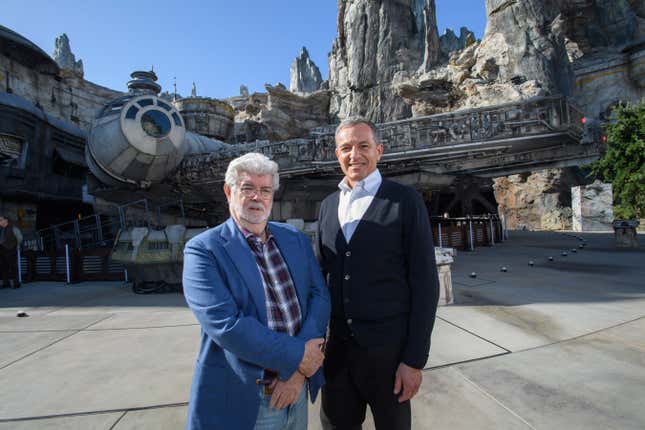
Hollywood legend George Lucas has drawn his lightsaber on the side of Bob Iger, backing the Walt Disney Company CEO in his proxy battle against activist investor Nelson Peltz.
His endorsement comes just weeks before Disney’s annual shareholder meeting on April 3, where investors will vote for the company’s board of directors. Peltz’s Trian Fund Management, which owns $3.5 billion worth of Disney stock, has nominated both Peltz and former Disney CFO Jay Rasulo to Disney’s board.
Lucas, the Star Wars creator, is currently the largest individual investor in Disney. He received 37.1 million Disney shares when he sold Lucasfilm for $4.05 billion in October 2012. Despite a difference in opinion over the future of his franchise, Lucas told CNBC on Tuesday that he was backing Iger.
“Creating magic is not for amateurs. When I sold Lucasfilm just over a decade ago, I was delighted to become a Disney shareholder because of my long-time admiration for its iconic brand and Bob Iger’s leadership,” Lucas said in a statement. “When Bob recently returned to the company during a difficult time, I was relieved. No one knows Disney better.”
Lucas said he has “full faith and confidence” in Disney and inbIger’s track record. He added that he voted all of his shares in support of Disney’s 12 nominees, which include General Motors CEO Mary Barra and Disney chairman Mark Parker.
Lucas is just the latest influential individual or group to back Disney over Peltz, joining the likes of JPMorgan Chase’s Jamie Dimon.
Nine grandchildren of the company’s co-founders, Walt and Roy Disney, have opposed Peltz’s bid. The proxy advisory firm Glass Lewis and activist investor ValueAct have also backed Iger and the board.
“They are not interested in preserving the Disney magic, but stripping it to the bone to make a quick profit for themselves,” Roy P. Disney told The New York Times last month.
Trian released a 133-page paper earlier this month outlining Peltz’s plans for the company. His vision includes restructuring leadership, aligning performance-based compensation with shareholder value, and developing a strategy to reach margins similar to Netflix’s 15% to 20% by 2027.
“But despite its many advantages, Disney has lost its way. Disney fell from its #1 position at the box office, was late to enter the streaming business and doubled down on linear TV at the wrong time,” Trian said in a letter sent to Disney shareholders.
The investment firm Blackwells Capital has also nominated three candidates for the board.